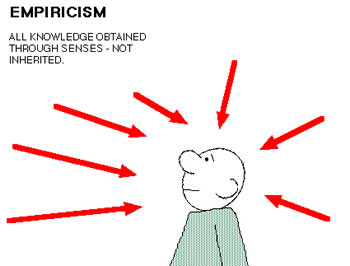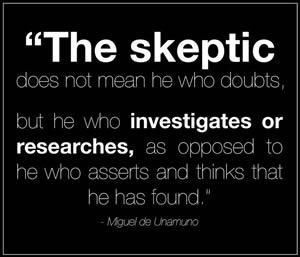Difference between Empiricism and Skepticism
Key Difference: Empiricism and Skepticism are two different concepts that have primarily to do with belief. Empiricism refers to the concept that knowledge comes only or primarily from sensory experience. Skepticism refers to someone who doubts the authenticity or veracity of something.
 Empiricism and Skepticism are two different concepts that have primarily to do with belief. Both are philosophies that deal with finding out the truth. However, they differ in the manner in which they look for and deal with the information or knowledge presented to them. Yet, they are more similar than more people realize.
Empiricism and Skepticism are two different concepts that have primarily to do with belief. Both are philosophies that deal with finding out the truth. However, they differ in the manner in which they look for and deal with the information or knowledge presented to them. Yet, they are more similar than more people realize.
Empiricism is a philosophical concept. The term derives from the Greek word, ‘empeiria’, which translates to the Latin ‘experiential’. This in turn leads to the words ‘experience’ and the related ‘experiment’ in English. Hence, empiricism refers to the concept that knowledge comes only or primarily from sensory experience, i.e. the five senses. According to empiricism, all knowledge is derived from what we observe and experience in the world around us. If we cannot see it, experience it, or prove it, it does not exist.
The term skepticism has taken up place in common parlance. Here, it typically refers to someone who doubts the authenticity or veracity of something. For example: Adam is skeptical of the numbers in the spreadsheet. However, that is not exactly what the term means originally in the context of philosophy. The term skepticism comes from the classical Greek verb, ‘skeptomai’, which basically means "to search", the implication being searching, but not finding.
Hence, there are people out there that claim that skepticism, at least in its original context, has nothing to do with doubt, disbelief, or negativity, but rather is about searching for the truth. It is the process of ‘finding a supported conclusion, not the justification of a preconceived conclusion.’ It can be said that it is the process of applying reason and critical thinking to determine validity of something, even if it is taken by fact by the public.
So, in summary, empiricism is a theory that states that knowledge comes only or primarily from sensory experience, which means that it emphasis proving something as fact either by experience or by experiment before believing it as fact. Skepticism, on the other hand, doubts the veracity of something and search for the truth. Looking their definitions, it can be said that the two terms have a lot more in common that they are often given credit for.
 While the terminology or process might differ, both empiricism and skepticism at their core are methods to look for or search for the truth. However, the way in which they approach to the truth differs, empiricism looks at experience, experimentation, and evidence to prove that something is true, while skepticism doubts everything until it is proven otherwise.
While the terminology or process might differ, both empiricism and skepticism at their core are methods to look for or search for the truth. However, the way in which they approach to the truth differs, empiricism looks at experience, experimentation, and evidence to prove that something is true, while skepticism doubts everything until it is proven otherwise.
Additionally, empiricism is also commonly associated with science and research, and has directly culminated into the scientific method which requires that everything be first proven though a strict scientific process that can be replicated before it is accepted as fact.
Skepticism, on the other hand, is associated with various other fields, for example: moral skepticism, religious skepticism, skepticism of knowledge, etc. In each regard, it refers to doubting concepts in that field, such as moral skepticism doubts morality, religious skepticism doubts the existence of God, while skepticism of knowledge doubts the nature of knowledge. There is also a field referred to as scientific skepticism that doubts testing beliefs for reliability and requires them to be subjected to systematic investigation using the scientific method, in order to discover empirical evidence for them.
Comparison between Empiricism and Skepticism:
|
|
Empiricism |
Skepticism |
|
Definition (Oxford Dictionaries) |
The theory that all knowledge is based on experience derived from the senses. Stimulated by the rise of experimental science, it developed in the 17th and 18th centuries, expounded in particular by John Locke, George Berkeley, and David Hume. |
A skeptical attitude; doubt as to the truth of something The theory that certain knowledge is impossible |
|
Description |
A theory that states that knowledge comes only or primarily from sensory experience. |
Any questioning attitude or doubt towards one or more items of putative knowledge or belief. |
|
Derived From |
Derives from the Greek word ἐμπειρία, empeiria, which is cognate with and translates to the Latin experientia, from which are derived the word experience and the related experiment. |
Derives from the classical Greek verb, skeptomai, "to search", implying searching but not finding. |
|
Type of |
Philosophical Theory |
Philosophical Theory |
|
Related Fields |
Science, Research, IT |
Morality, Religious, Knowledge, Science, Research |
Reference: Oxford Dictionaries (Empiricism, Skepticism), Wikipedia (Empiricism, Skepticism), Skeptoid Image Courtesy: papermasters.com, pinterest.com









Add new comment